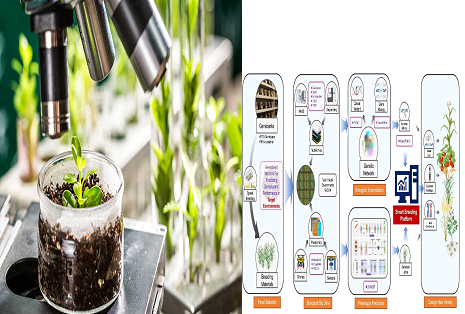The world’s population is set to grow to nearly 10 billion by 2050, and with this growth comes an enormous challenge: ensuring there is enough food to meet the demand. However, environmental factors, such as changing climate patterns, water scarcity, and soil degradation, make it increasingly difficult to maintain agricultural productivity. As traditional farming methods struggle to adapt to these changes, plant breeders are turning to advanced technologies, and one of the most promising among them is Machine Learning (ML). ML’s ability to analyze massive datasets could be the key to accelerating the development of crops that are both high-yielding and resistant to climate change and other stresses.
The Need for Innovation in Plant Breeding
In the past, plant breeding primarily involved the selection of plants with desirable characteristics through trial and error. While these methods have served humanity well for centuries, they are no longer sufficient in the face of modern challenges. The global agricultural system is under unprecedented stress, driven by the combined pressures of a growing population and a rapidly changing climate. The temperature is rising, extreme weather events like heatwaves and droughts are becoming more frequent, and greenhouse gas emissions are at historic levels.
To meet the food demands of an ever-growing population, agricultural production must increase by 70% by 2050. Yet, we’ve already lost a third of the world’s arable land to urbanization and soil erosion over the past few decades. Farmers are finding it increasingly difficult to grow crops in these compromised conditions. This is where plant breeding comes into play. By developing crop varieties that are resistant to biotic (pests and diseases) and abiotic (climate-related) stresses, plant breeders can boost agricultural productivity and improve food security.
Traditional Breeding Techniques and Their Limitations
Historically, plant breeders have relied on traditional statistical methods to identify desirable traits in crops. However, with the advent of genomics, phenomics, and other cutting-edge technologies, the amount of data that needs to be processed has exploded. For example, genome-wide association studies (GWAS) and next-generation sequencing (NGS) technologies are generating massive datasets that can’t easily be analyzed using conventional methods.This is where Machine Learning (ML) steps in. Machine learning, a subset of artificial intelligence (AI), uses algorithms to learn patterns from data and make predictions. By applying ML models to plant breeding, researchers can extract valuable insights from large datasets, accelerating the identification of optimal traits for crop improvement.
The Role of Machine Learning in Plant Breeding
ML algorithms are able to process vast amounts of data more efficiently than traditional methods. These algorithms can analyze both genomic data (DNA sequences) and phenotypic data (observable traits like yield, disease resistance, and growth patterns). With advanced ML models, plant breeders can predict how different genetic traits will manifest in different environmental conditions, helping them develop crops that perform well in a variety of climates and soil types.
Machine learning can be applied in several areas of plant breeding, such as:
- Biotic and Abiotic Stress Assessments: Plants are constantly exposed to various biotic stresses (such as pests and diseases) and abiotic stresses (such as drought, temperature fluctuations, and soil salinity). Traditional methods of assessing plant stress tolerance rely heavily on morphological data and are time-consuming. ML algorithms, however, can quickly analyze large volumes of data and predict how plants will respond to different stressors. By combining phenomics, genomics, and metabolomics data, ML models can predict which plant varieties are most resistant to stress, ensuring that future crops will thrive in unpredictable environmental conditions.
- Genetic Diversity Analysis: Genetic diversity is crucial for plant breeding because it helps ensure that crops can adapt to changing environments. Traditional methods for assessing genetic diversity involve time-consuming multivariable analyses. Machine learning, especially deep learning techniques like convolutional neural networks (CNNs), can automate these analyses, providing breeders with faster and more accurate results. This allows for the identification of superior genotypes with desirable genetic traits.
- Yield Prediction and Component Analysis: One of the biggest challenges in plant breeding is predicting yield. Yield is influenced by multiple factors, including environmental conditions, pest pressure, and genetic makeup. ML models can account for the complex relationships between these factors, providing more accurate yield predictions. These models can analyze environmental data (such as temperature, rainfall, and soil moisture) alongside genetic data to predict how different crop varieties will perform under various conditions.
- Cross-Breeding and Hybrid Prediction: In order to develop superior crop varieties, breeders often cross two different plant varieties. However, predicting the success of these crosses is not always straightforward. ML models, particularly artificial neural networks (ANNs), can help breeders predict the outcomes of hybridization by analyzing the genetic and phenotypic traits of the parent plants. This can lead to more efficient hybrid breeding programs and the development of crops with desirable traits, such as higher yield, better disease resistance, or improved nutritional content.
- Genotype-Environment Interactions: The interaction between genotype and environment (GEI) can significantly affect a crop’s performance. GEI is a major factor that complicates yield prediction and the selection of superior plant varieties. ML models can analyze the relative performance of genotypes across different environments, helping breeders make better decisions about which crops to plant in specific regions.
- Phenomic and Genomic Integration: One of the most significant challenges in modern plant breeding is bridging the gap between genotype (genetic makeup) and phenotype (observable traits). Advanced sequencing technologies have provided a wealth of genomic data, but interpreting this data and linking it to phenotypic traits is still a major hurdle. Machine learning can play a critical role in bridging this gap by analyzing genomic data and predicting phenotypic traits, such as yield, disease resistance, and drought tolerance.
The Future of Plant Breeding with Machine Learning
The integration of machine learning in plant breeding has the potential to revolutionize agriculture. With access to more data and more advanced computational tools, breeders can accelerate the development of crops that are not only more resilient to climate change but also more productive and nutritious. ML can help breeders make faster, data-driven decisions, reducing the trial-and-error process that has traditionally been a hallmark of plant breeding. Moreover, machine learning can help reduce the resources required for breeding programs. By predicting which genetic combinations are most likely to result in desirable traits, ML can minimize the number of plants that need to be grown and tested. This could save both time and resources, making plant breeding more efficient and sustainable.
As the global population continues to grow, ensuring food security will become increasingly difficult. Machine learning offers a promising solution to this challenge by enabling plant breeders to make more accurate predictions, identify superior crop varieties, and develop high-yielding, climate-resilient crops. While traditional methods of plant breeding will still have a role to play, the integration of machine learning promises to accelerate progress and make feeding the world’s population by 2050 a more achievable goal. By harnessing the power of ML, we can overcome the challenges posed by climate change and limited resources, ensuring that future generations have access to the food they need to thrive.
(The Author is Scientist- MRCFC-Khudwani, SKUAST-Kashmir. Visiting Scientist at University of Nebraska Lincon USA. EMAIL ID; [email protected] & [email protected])








